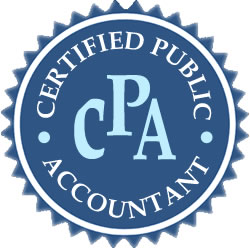The Beginner’s Guide to
Becoming a CPA
Presented by: BestAccountingDegrees.net
 It’s not uncommon for kids in school to grumble about taking math classes and think, "When will I ever need this in my life?" Well for the students who go on to become accountants, they use most of those skills every day. There are many different types of accountants, and the term "CPA” refers to a particular type of highly qualified accountant who has a knowledge of both finance and business. Check out this in-depth guide to everything a person needs to know about the career field, from what exactly a CPA is (chapter one) to resources for finding work after achieving certification (chapter 10).
It’s not uncommon for kids in school to grumble about taking math classes and think, "When will I ever need this in my life?" Well for the students who go on to become accountants, they use most of those skills every day. There are many different types of accountants, and the term "CPA” refers to a particular type of highly qualified accountant who has a knowledge of both finance and business. Check out this in-depth guide to everything a person needs to know about the career field, from what exactly a CPA is (chapter one) to resources for finding work after achieving certification (chapter 10).
Readers of this guide will also learn about what to expect from daily life if they become a certified public accountant and all about the "Four E’s" of certification – education, exam, experience, and ethics. CPAs need to meet strict requirements in all these areas – which vary somewhat according to state – in order to become licensed. When delving into this beginner’s guide, readers will also learn about what kind of salary they can expect to make and what the future holds for the profession (chapters 8 and 9, respectively). And for the more ambitious CPAs out there, chapter 7 offers great information about how to start an independent accounting firm.





- Introduction to CPA Requirements
- General CPA Licensing Questions
- Obtaining a CPA Certificate (Louisiana)
- Certification FAQs (Massachusetts)
- Education and Experience Requirements (New Jersey)
- What Happens if CPA Candidates Can’t Meet the Work Experience Requirement?
- CPAs Might Meet Experience Requirement by Working in Industry





Copyright © 2014 BestAccountingDegrees.net / All rights reserved.